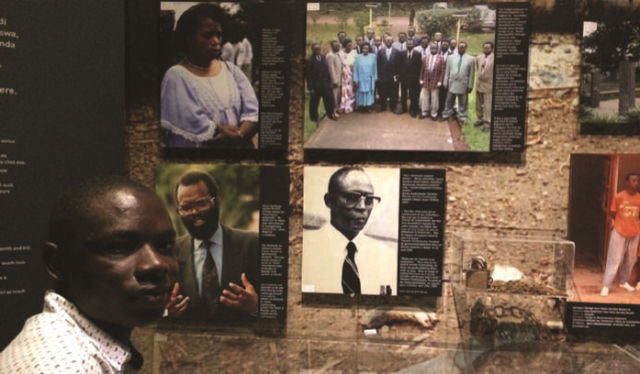
The church had refused to acknowledge, let alone apologise for, its notorious role in setting the stage for, enabling and ultimately participating in the genocide
By Gerald Caplan
April 7 marked the 23rd anniversary of the genocide of Rwanda’s Tutsi by the country’s Hutu majority, and the Roman Catholic Church has gifted the country with a belated treasure – seeking forgiveness for its complicity in the genocide. Pope Francis has acknowledged that the church bore institutional responsibility, as did individual priests and nuns who “succumbed to hatred and violence, betraying their own evangelical mission” by their participation.
Alas, his statement is fully two popes and 23 years late.
Those who still regard Africa as the dark continent might be surprised to learn that about 80 per cent of Rwandans are Christian, two-thirds of whom are Roman Catholic. This is true of both Hutu and Tutsi. It was Catholic missionaries, almost a century before the 1994 genocide, who popularised the notion of Hutu and Tutsi as two distinct, irreconcilable peoples, forever divided. For three decades before the genocide, the church helped disseminate the lethal proposition that the Hutu were superior to the untrustworthy alien Tutsi.
For most of the 20th century, the Catholic hierarchy in Rwanda shared power with secular authorities. In the years just before the genocide, the senior Catholic archbishop was an intimate of both the Hutu dictator and his wife, who ran the country as a corrupt ethnic family dictatorship.
Once the genocide began, church leaders, now mostly Hutu, failed to condemn their Hutu extremist friends who were carrying out this African holocaust. While some priests and nuns distinguished themselves by saving threatened Tutsi, far more, alas, actively collaborated with the genocidaires in their murderous exploits or at best stood by, silent.
Had they stood up and denounced the plot, had Pope John Paul II, a great traveller, flown to Rwanda during the genocide (as he had earlier) to demand that his flock stop their killing, the genocide might well have been stopped in its track. Instead, they allowed perhaps a million defenceless, innocent Tutsi to be murdered by the extremists.
When it was all over, Catholic officials, both in Rwanda and Rome, intransigently refused to apologise. Indeed, the defeated Hutu killers evidently had powerful friends in the Vatican who helped accused priests and nuns hide throughout Europe, evading justice. In 1996, for example, John Paul II refused to accept institutional blame for the church’s role in the genocide. “The church in itself,” he wrote, “cannot be held responsible for the misdeeds of its members who have acted against evangelical law.”
Four years later, however, John Paul did make a general apology for a host of Catholic sins and crimes over its 2,000-year history. Anxious to be known as the great healer who recognised the Church’s sins, the Pope even apologised for the two millennia during which his church fomented anti-Semitism among its flock. Yet he steadfastly refused to acknowledge, let alone apologise for, the notorious role of his church in setting the stage for, enabling and ultimately participating in the genocide in Rwanda.
To be fair, there were other sins for which John Paul II failed to apologise. In a powerful book, `Genocide in Rwanda: Complicity of the Churches’, some 20 mostly Catholic writers, including the nun who co-edited the book and several Rwandans, overwhelmingly agreed that the church was indeed complicit. But not just in Rwanda.
Setting the larger perspective, one contributor, Jerry Fowler of the U.S. Holocaust Memorial Museum in Washington, pointed to the many other nightmares for which the church had never accepted responsibility, from Central America to Congo/Zaire. In those, Fowler wrote, leading church hierarchs had openly aligned themselves with terrorising elites who practised wholesale violence and unspeakable human-rights abuses, or at best, remained bystanders. The evidence, argued Fowler, showed that Rwanda was just another day’s work for the Roman Catholic Church.
Today, the church is a house deeply divided. As a recent headline from the Guardian Weekly summed it up, “Civil War Strikes Vatican: Despite Francis’s global popularity, rebellion is in the air.” Nor is it clear Francis will best the intransigent old guard conservatives on many vital issues, including, shockingly, child abuse and its cover-up. But on Rwanda at least, and at long last, the side of the angels finally triumphed.
****
Gerald Caplan is an Africa scholar, a former New Democratic Party national director and a regular panelist on CBC’s Power & Politics.
****
Source: Globe & Mail
 The Independent Uganda: You get the Truth we Pay the Price
The Independent Uganda: You get the Truth we Pay the Price



Christians are so called for their following of Jesus Christ. The Christian flock and their leaders are brought up to follow the teachings and practical examples of Jesus Christ. Honesty is one of the great virtues of Christianity. Humility is another. The Ten Commandments, the Beatitudes and the multitude of Jesus’s teachings are the requirements for Christian living. Short of that a Christian is a hypocrite and not a Christian.
Better late than never. I appreciate this apoloy, even if a belated one.
How will this apology benefit Rwandese? If Holy father has apologized, has he apologized to saints? Or do those he has apologized to also owe apologies? If so, maybe it’s time to emulate his Holiness.
You are right. Christians in particular should lead in accepting that they sinned and ask for forgiveness from the individuals and families they offended.
Nationally this should also be done through a Truth Commission or truth telling. This way Rwandans will reconcile. They will ensure they never ever repeat the gruesome act of genocide.